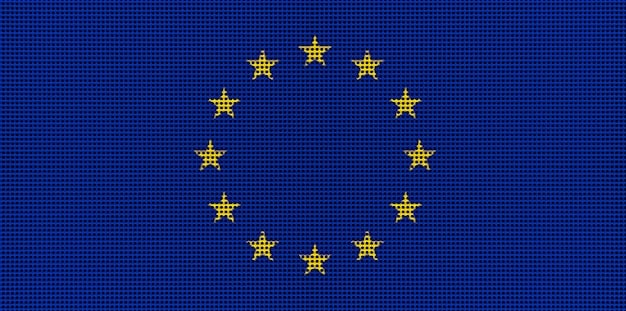EU Data Privacy Laws: Impact on US Tech Companies in Europe

The new EU data privacy laws, such as GDPR, significantly impact US tech companies operating in Europe, requiring them to comply with stringent data protection standards, potentially leading to increased compliance costs and altered business practices.
The digital landscape for US tech companies operating in Europe has been dramatically reshaped by the introduction of new EU data privacy laws. These regulations demand a fundamental shift in how data is handled, impacting everything from data collection to storage and processing. Understanding the **impact of the new EU data privacy laws on US tech companies operating in Europe** is crucial for maintaining compliance and competitive advantage.
Understanding EU Data Privacy Laws
The European Union has established itself as a global leader in data privacy and protection. Its stringent regulations are designed to ensure the privacy rights of EU citizens and to regulate how personal data is collected, processed, and stored. For US tech companies operating within the EU, compliance with these laws is not merely a suggestion but a legal necessity.
Key Regulations: GDPR and Beyond
The General Data Protection Regulation (GDPR) is perhaps the most well-known EU data privacy law. It applies to any organization that processes the personal data of EU citizens, regardless of where the organization is located. GDPR sets a high standard for data protection, requiring companies to obtain explicit consent for data collection, provide transparency about data usage, and implement robust security measures to protect data from breaches. However, GDPR is not the only relevant regulation.
- ePrivacy Directive: Focuses on the privacy of electronic communications, including cookies and direct marketing via email.
- Data Protection Directive: The predecessor to GDPR, it still influences how national laws within the EU are interpreted.
- Digital Services Act (DSA): Aims to create a safer digital space where the fundamental rights of users are protected and to establish a level playing field for businesses.
These regulations collectively form a comprehensive framework that US tech companies must navigate. Failing to comply can result in significant fines, reputational damage, and even the inability to operate within the EU market.

The Direct Impact on Data Handling Practices
EU data privacy laws have a profound and direct impact on the data handling practices of US tech companies. They necessitate a complete overhaul of many traditional approaches to data collection, processing, and storage.
Consent Requirements
One of the most significant changes is the requirement for explicit and informed consent. Companies can no longer rely on pre-ticked boxes or ambiguous language in their terms of service. Consent must be freely given, specific, informed, and unambiguous. This means clearly explaining what data is being collected, how it will be used, and obtaining affirmative agreement from the user.
Data Minimization
EU law also emphasizes the principle of data minimization. Companies should only collect data that is necessary for a specific purpose. They should not collect excessive or irrelevant data. This requires a careful assessment of data needs and a commitment to limiting data collection to what is strictly required.
Data Security
US tech companies must implement robust security measures to protect personal data from unauthorized access, loss, or destruction. This includes using encryption, access controls, and regular security audits. They must also have a clear process for responding to data breaches and notifying affected individuals and authorities.
These requirements place a significant burden on US tech companies, requiring them to invest in new technologies, processes, and training to ensure compliance. The culture of data collection and use that prevailed before these regulations is no longer viable in the EU market.
Increased Compliance Costs
Complying with EU data privacy laws is not a simple or inexpensive undertaking. US tech companies must be prepared to invest significant resources in legal support, technology upgrades, and employee training.
Legal and Consulting Fees
Navigating the complex landscape of EU data privacy laws requires expert legal guidance. Companies need to engage lawyers and consultants who specialize in data protection to understand their obligations and develop compliance strategies. This can involve significant legal fees.
Technology Investments
Many existing systems and technologies may not be compliant with EU data privacy laws. Companies may need to invest in new technologies to ensure they can obtain valid consent, protect data security, and respond to data subject requests. This could include implementing consent management platforms, encryption tools, and data loss prevention systems.
Training and Awareness
Compliance with data privacy laws is not just a matter of technology; it also requires a change in organizational culture. Employees must be trained on data privacy principles and their responsibilities under the law. This includes training on how to obtain valid consent, handle data subject requests, and report data breaches.
These costs can be particularly burdensome for small and medium-sized US tech companies that may not have the resources to invest in comprehensive compliance programs. However, failing to comply can be even more costly in the long run.

Impact on Business Models and Strategies
Beyond the direct costs of compliance, EU data privacy laws can also impact the business models and strategies of US tech companies. Companies may need to rethink how they collect, use, and monetize data.
Personalized Advertising
EU data privacy laws can significantly impact the ability of US tech companies to deliver personalized advertising. The requirement for explicit consent means that companies can no longer track users without their permission. This can make it more difficult to target advertising and measure its effectiveness.
Data-Driven Innovation
The restrictions on data collection and use can also impact data-driven innovation. Companies may find it more difficult to develop new products and services that rely on large datasets. They may need to find alternative ways to innovate that do not rely on extensive data collection.
Market Access
Ultimately, compliance with EU data privacy laws is a prerequisite for accessing the EU market. US tech companies that fail to comply risk losing access to one of the world’s largest and most affluent markets.
These laws force US tech companies to innovate within a tighter regulatory framework. While this may present challenges, it can also drive innovation in privacy-enhancing technologies and business models.
Enforcement and Penalties
The EU is serious about enforcing its data privacy laws. National data protection authorities have the power to investigate and fine companies that violate the law. The penalties for non-compliance can be severe.
GDPR Fines
Under GDPR, companies can be fined up to 4% of their annual global turnover or €20 million, whichever is greater. These fines are intended to be a deterrent and to ensure that companies take data privacy seriously.
Other Penalties
In addition to fines, companies may also face other penalties, such as orders to cease processing data or bans on operating within the EU. These penalties can be especially damaging to companies that rely on data processing for their core business.
Recent Cases
Several high-profile cases have demonstrated the EU’s willingness to enforce its data privacy laws. These cases serve as a warning to US tech companies that they must take compliance seriously.
The potential for significant penalties underscores the importance of proactive compliance efforts. US tech companies should not wait to be investigated before taking steps to comply with EU data privacy laws. They need to address the new requirements immediately.
Strategies for US Tech Companies to Ensure Compliance
US tech companies can employ several strategies to ensure compliance with EU data privacy laws. A proactive approach is vital, focusing on building a culture of privacy and incorporating privacy considerations into every aspect of business operations.
Data Protection Officer (DPO)
Appointing a Data Protection Officer (DPO) is a key step. The DPO is responsible for overseeing data privacy compliance and advising the organization on its obligations. They act as a point of contact for data protection authorities and data subjects. While not always legally required depending on the size and nature of the company, a DPO demonstrates a commitment to data privacy.
Privacy by Design and Default
Embracing “privacy by design” and “privacy by default” principles ensures that privacy considerations are integrated into the design of new products and services. This means minimizing data collection, implementing strong security measures, and providing users with control over their data from the outset. Privacy should not be an afterthought but a fundamental design principle.
Regular Audits and Assessments
Conducting regular audits and assessments helps identify gaps in compliance and areas for improvement. These audits should cover all aspects of data processing, from data collection to storage and disposal. Assessments should also evaluate the effectiveness of security measures and compliance procedures.
By implementing these strategies, US tech companies can enhance their compliance posture and demonstrate their commitment to protecting the privacy of EU citizens. This builds trust and fosters long-term sustainability in the European market.
| Key Aspect | Brief Description |
|---|---|
| 🔐 GDPR Compliance | Ensuring adherence to the General Data Protection Regulation. |
| 💰 Increased Costs | Financial implications of complying with new data laws. |
| 💼 Business Models | Impact on how US companies operate in Europe. |
| 🛡️ Data Security | Protecting user data through robust security measures. |
Frequently Asked Questions
▼
The key laws include the General Data Protection Regulation (GDPR), the ePrivacy Directive, and, more recently, the Digital Services Act (DSA), each setting standards for data protection.
▼
GDPR requires explicit consent for data collection, mandates data minimization, and necessitates robust data security measures to protect personal data of EU citizens.
▼
Compliance costs include legal and consulting fees, investments in new technologies for data protection, and employee training to ensure proper data handling.
▼
The explicit consent requirement limits the ability of US tech companies to track users without permission, affecting the targeting and measurement of personalized advertising efforts.
▼
Strategies include appointing a Data Protection Officer, incorporating “privacy by design” principles, and conducting regular audits and assessments to identify and address compliance gaps.
Conclusion
In conclusion, the EU’s data privacy laws, particularly GDPR, have profoundly reshaped the operational landscape for US tech companies in Europe. While compliance presents challenges and increased costs, embracing these regulations proactively can lead to enhanced business models, improved data security, and strengthened trust with European consumers.





